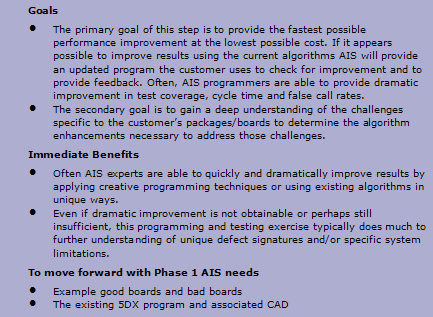|
 |
AIS
uses a direct customer engagement model and a two
phase approach to create 5DX Enhancements:
Phase_1 -
a feasibility study which results in an improved
program and/or the knowledge required to move to
the next phase.
Phase_2 -
algorithm modification or creation of a new algorithm.
This
direct customer engagement model represents a significant
shift from the software update
contracts that Agilent previously offered.
|
|
Phase
1: Feasibility and Investigation
AIS system experts work closely with the customers’ experts
on improving results. Our engineers use skills,
knowledge and techniques that have evolved
through many years of working with the collective global 5DX customer base
on the most difficult programming challenges.
|
| |

|
|
| Phase
2: Algorithm Modification |
| The
learning, samples and results from Phase 1 are used
to estimate the cost/feasibility/schedule required
to provide 5DX algorithm enhancements. The goal is
for AIS to provide a new or improved algorithm to successfully
address the challenge. The resulting new/modified algorithm
is licensed for use on the customer’s machine(s). |
|
| How
is this different than the previous Agilent Model
and Why? |
Most
recent 5DX enhancement desires take the form of algorithm
improvement requests. Either customers are experiencing
an escape mechanism or are experiencing excessive false
call rates. In the past, Agilent funded algorithm improvements
through software update service contracts. This is
an excellent approach for a machine in volume production
and the improvements were also supplemented through
improvements needed to spur on-going system sales.
Selection of which improvements were to be attempted
was a function of several variables including the degree
of difficulty, the availability of needed materials,
the estimated impact on customer satisfaction, and
the impact on near term sales.
While the Agilent model made excellent sense for a system manufacturer, AIS has
selected a path that provides a more direct customer engagement model. The key
upside of this new approach is the ability of a customer with a
specific need to absolutely drive highly
focused improvement activities to address their specific challenge(s). |
|
|
 |






